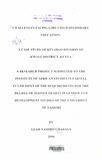| dc.description.abstract | This study set out to document and discusses the challenges facing girl child
secondary education in Kinango division, Kwale district. The unit of analysis was the
secondary girl child.
The underlying social and economical factors constitute the challenges that face
the girl child in achieving secondary education. These are heightened by aggravated
economic conditions of most families and issues pertaining to patriarchy in the
society.
The objectives of the study were, first, to investigate the extent to which poverty
affects the girl child in getting a secondary education. Secondly, I wanted to find out
how early marriage practices hinder the girl child's secondary education.
Data were collected through structured interviews, key informant interviews,
focus group discussions and observation. Primary data was collected using
questionnaires and interview methods from the target groups, secondary data was
obtained from the existing data at the Ministry of Education. It gave 'information on
the previous and current trends in secondary Level of education. The resulting data
was then analyzed using descriptive data. Looking at the consistencies and
percentages of the frequencies did this. A sample of the girls was used to tap
information; case studies of girls who have dropped out of school and focus group
discussions were used to establish changes facing girls in achieving a secondary
education. The unit of analysis was the girl child in secondary schools in Kwale
district. The class registers were used as the main sampling frame.
The findings suggest that poverty and socio-cultural challenges playa key role
in the enrolment, retention, performance and dropout of girls from school. Poverty has
driven girls to work as domestic servant, barmaids and commercial sex workers. The
reasons given for dropout, retention or poor performance are rad ically along gender
lines. Poverty, pregnancy, declining performance, dropping out of school and gender
discrimination are some of the key drawback to girls' education achievement. Others
are marriage and the lure of money.
Arising from the findings the following recommendations are made: A way
should be found on establishment of purely girls boarding schools to protect them
from various destructors. There should be regular community leadership forums
where they can come up with pragmatic ways of education development and
achievement in the area. Information on reproductive health should be accessed and
taught to girls so that they can prevent STls. Or unwanted pregnancies apart from
abstention since they are sexually active and the society is promiscuous. | en_US |



